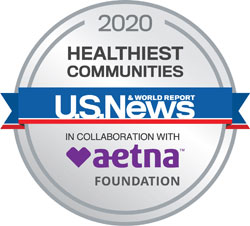Healthiest Comunities
 Check out the new Healthiest Communities Rankings from U.S. News in collaboration with the Aetna Foundation.
Check out the new Healthiest Communities Rankings from U.S. News in collaboration with the Aetna Foundation.
Based on a review of data collected in more than 3,000 counties, these rankings are a free and open-access public health data analysis tool featuring some of the healthiest communities in the U.S. Not only do these rankings provide a better understanding of how to improve health, but they inspire change by showcasing best practices that can be used to improve health interventions within our own communities.
As in previous years, the rankings show us that the health of a community is shaped by many social and physical factors, including low obesity, low smoking rates, strong pre-K education, access to healthy foods, etc. This year, the rankings come with a set of tools tracking COVID-19 data. The new COVID-19 tools track case numbers, death rates, hospitalizations, unemployment and more, revealing the relationship between the pandemic and community health.
APHA is helping spread the word about the rankings and the new COVID-19 tools in an effort to help build strong health agendas that lead to healthier communities and overcome the threats of the current global pandemic.
“These rankings provide an opportunity for our nation to look to those who are further along in addressing the social determinants of health,” said APHA Executive Director Georges C. Benjamin, MD. “Identifying where improvement is needed in societal systems affecting our health enables us to learn from one another and create informed, data-driven solutions.”
As part of the 2020 Healthiest Communities rankings launch, U.S. News will host the inaugural Community Health Leadership Forum webinar series. Themes include: building the foundation of a healthy community, key takeaways from the 2020 health crises and addressing racism as a threat to public health.
APHA’s own Associate Executive Director of Public Health Policy and Practice, Regina Moss, will participate in the series. Moss, alongside others, will discuss the best ways to address poverty in the Sept. 30 "Addressing Poverty and Racism As Public Health Threat" webinar.
